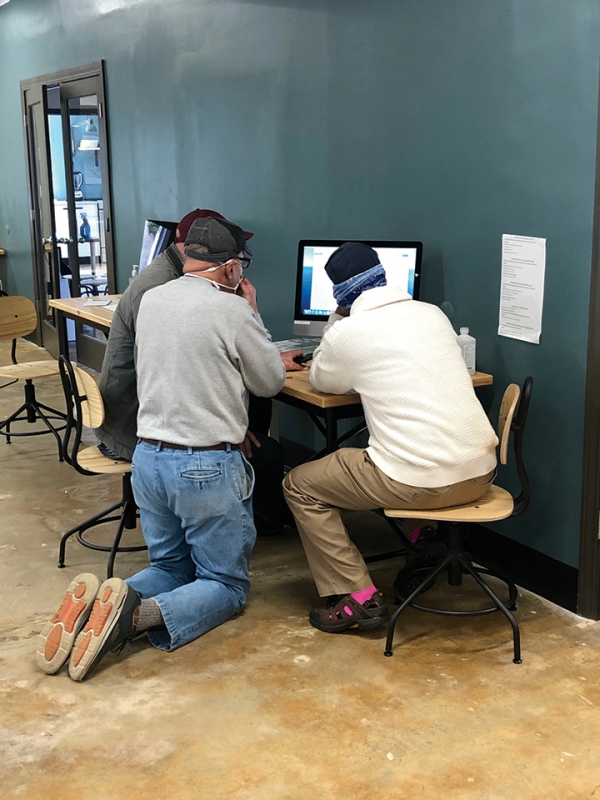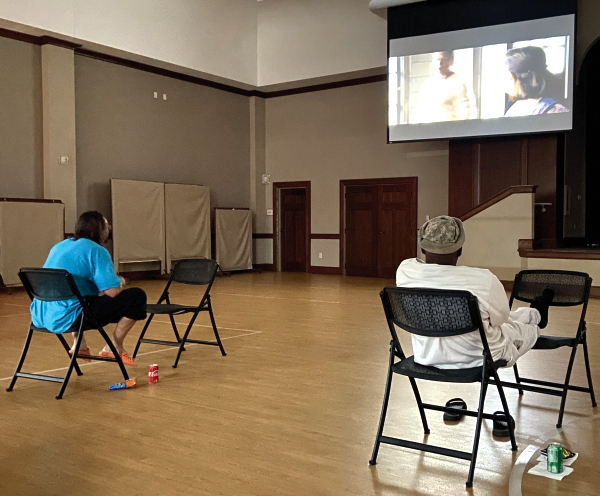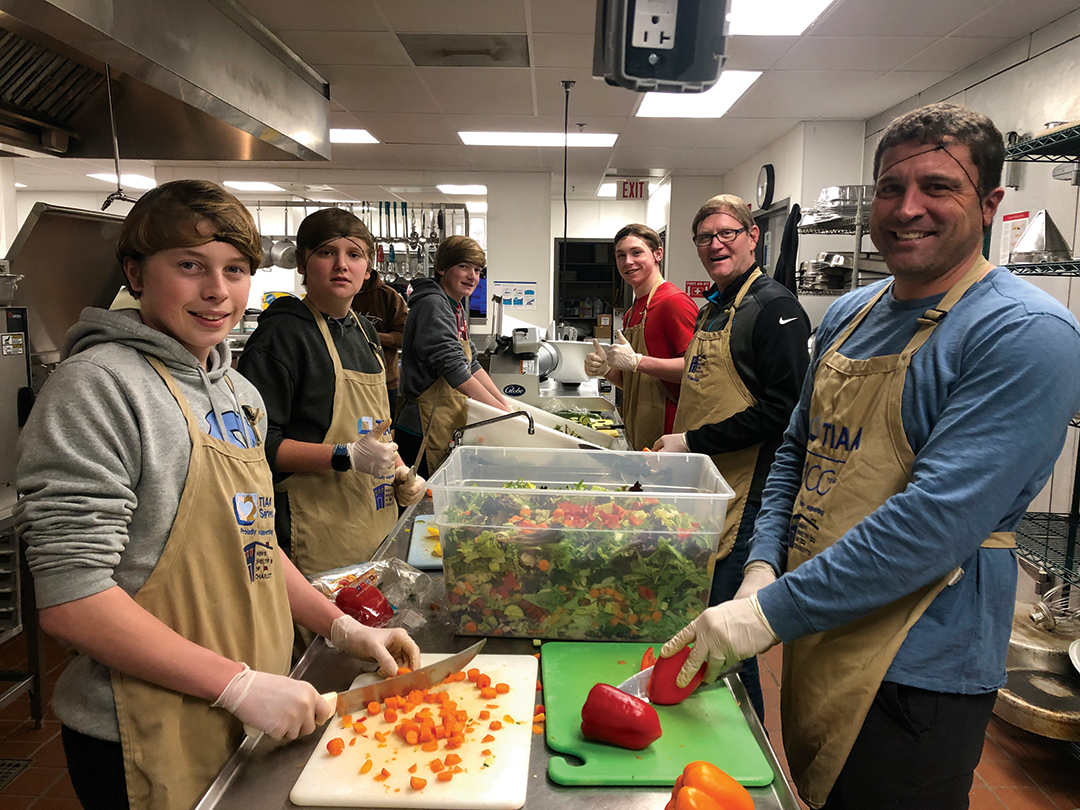Disciple: Why Doesn't He Move in Here?

How churches across the Diocese engage in ministry with their neighbors experiencing homelessness
Church of the Holy Family, Chapel Hill, has for many years engaged in ministry with men reentering society upon their release from Orange Correctional Center.
“I’ve always said reentry work is homelessness prevention because these guys leave jail with essentially nothing, and this is a bewildering world to enter,” said the Rev. Clarke French, rector of Holy Family.
Thomas, a 64-year-old man who had been incarcerated for 40 years, faced an especially challenging reentry. Without enough working years to draw Social Security and Medicare, and never having used a smartphone or an ATM, Thomas was entering a world unrecognizable from the one he left behind. Holy Family’s reconciliation and reentry team believed it would have eight months to prepare, but then Thomas was released six months early due to COVID-19. Without time to make detailed plans, the church needed to take action. Fortunately, the old Holy Family rectory, while it has been repurposed over time, still houses a small apartment.
“So I just said, ‘Why doesn’t he move in here?’” French explained. And Thomas did.
While most churches no longer have rectories on their properties, dozens of churches across our diocese engage in creative ministries with their neighbors experiencing homelessness. From donating homemade sleeping bags to retooling feeding ministries to maintaining long-standing relationships, congregations of all sizes and means find ways to meet the specific needs in their communities. Some house dozens of neighbors during the winter months, while others, like Holy Family, do the resource- and time-intensive work of providing wraparound services for a single individual.
[Image: Volunteers at the City with Dwellings day center engage with the ministry’s primary mission: providing a caring presence to help vulnerable people navigate complicated networks of social services. Photo courtesy of Lea Thullbery]
ADAPTING QUICKLY
Housing was only the beginning of Holy Family’s support for Thomas. A parishioner who owns a recycling company in Durham gave Thomas a job, and another loaned him a car. Several helped him acquire the necessary number of hours behind the wheel with a licensed driver to pass his driver’s test, and his new driver’s license allowed Thomas to open a bank account and more easily navigate a variety of other systems. The church also paid for Thomas to receive care from a private physician and a dentist after years of medical neglect. While he needed extensive support to rejoin society, Thomas is now on a sustainable path and working toward future goals.
During his time in prison, Thomas worked as a gardener, tending state-owned properties, including the governor’s mansion, and that is the work he would like to do in the future. Because the church does not charge him rent, Thomas has been able to save enough money to purchase a pickup truck and some landscaping equipment, and he now cares for the church property. Thomas is also searching for his own housing.
“I really think that, at the end of the day, we might have launched a human into the world who otherwise would have been ground under the teeth of this merciless world that he emerged into, completely unfamiliar with how far it had developed since the last time he saw a free day,” French said.
Thomas so captivated parishioners’ hearts that the church discerned a call to tear down the old rectory and build a new house so they can do this again.
Holy Family is not the only church that acted quickly to support neighbors experiencing homelessness during COVID-19. In April 2020, the then-rector at St. Mary’s, High Point, the Rev. David Umphlett, received a call from Open Door Ministries, a men’s shelter, about providing overflow shelter so the nonprofit could socially distance its residents by splitting them across two sites. Sheltering the men in hotel rooms had become unsustainable, but St. Mary’s parish life center made the perfect secondary site. From the second week of April until the first week of August, an average of 22 men lived full-time on St. Mary’s property. Volunteers from Open Door Ministries staffed the shelter and provided food throughout the week, and parishioners provided meals from Friday lunch through Sunday dinner.

St. Mary’s also strived to make the church feel like home. They installed picnic tables outside the parish life center, and parishioners frequently stopped by to drop off homemade baked goods, bottled water, hand sanitizer and, on one occasion, toys for a resident whose young daughter regularly came to visit him. Neighbors unaffiliated with the church who saw the men at the picnic tables volunteered to bring meals and help in other ways. All told, 150 volunteers worked together to support the church’s guests.
“It was all God’s work, totally God’s work,” said Audrey Congdon Harris, the parishioner who coordinated meals during St. Mary’s time as a temporary shelter. “This is what I hope we take from this whole disaster: We can take care of each other, and that is why we’re here on this earth, to love each other like Jesus loves us and to take care of each other.”
[Image: In an effort to make the parish life center feel more home-like, St. Mary’s, High Point, screened movies for the guests who lived there for several months during the COVID-19 pandemic. Photo courtesy of St. Mary’s]
LONG-TERM RELATIONSHIPS
St. Joseph’s and St. Philip’s, Durham, are two churches with long-standing relationships with their neighbors experiencing homelessness, and both needed to find new and creative ways to serve when the pandemic hit. St. Joseph’s has invited its unhoused neighbors, some of whom once slept on church grounds, to gather in the parish hall with parishioners and volunteers for a hot breakfast each weekday since 2007. When COVID-19 struck, out of concern for the safety of the medically vulnerable population it served, the communal breakfast went on hiatus, and a drop-by feeding ministry—sausage and egg biscuits, coffee, grits when available and bagged lunches—took its place. The church also provided information about testing and vaccination sites and helped its neighbors get vaccinated.
As more people get vaccinated and restrictions lift, St. Joseph’s has re-integrated the community aspect of its breakfast ministry. As of August 16, neighbors now gather in a socially distanced circle in the church’s driveway to enjoy breakfast casserole, grits and coffee.
“It is something to behold,” the Rev. Monnie Riggin, deacon at St. Joseph’s and diocesan deacon for anti-racism and reconciliation, said. “We are a community of people who gather in fellowship, eating together, and building relationships and trust. We take care of each other.”
St. Philip’s ministry with its neighbors experiencing homelessness also started with food served in the church’s parish hall. A former rector, the Rev. Gene Bolinger, used his discretionary fund to feed neighbors who knocked on the church door seeking help. His ministry evolved into a community kitchen serving two seatings of soup and sandwiches every day at noon. Eventually, capacity and accessibility concerns led St. Philip’s to join with other local organizations to plan for something larger and more sustainable.
The group first met in the fall of 1982 to consider building a facility with space to accommodate the community kitchen, Meals on Wheels, the Methodist clothing ministry, the Presbyterian food pantry, Women in Action for the Prevention of Violence and other nonprofits serving downtown Durham. Eventually, the partners decided to incorporate as a separate nonprofit, Urban Ministries Durham, and build a facility on a vacant lot St. Philip’s had purchased during the 1970s after an urban renewal effort led to the destruction of homes next to the church. On January 19, 1983, St. Philip’s parishioner and initial UMD board member Charlie Steel filed the articles of incorporation for UMD, and the people of St. Philip’s and their partners set about raising the $700,000 necessary to pay for the new facility. Now, UMD, which still sits on the lot St. Philip’s leases to it for $1 per year, feeds 200-250 people each day of the year, and its shelter—the result of a merger in 2002—is typically full.
St. Philip’s continues to support UMD in a variety of ways. Most recently, from April 1, 2020, through May 27, 2021, the church formed a “Sandwich Brigade” of 75 parishioners, neighbors and relatives to assist UMD’s bagged lunch program. The brigade met each Thursday in parishioner Susan Day Moore’s driveway to collect more than 250 sandwiches made at home; Stephanie Johnson, the chair of the UMD outreach committee, estimates they made a total of 14,000 sandwiches, plus providing fruit, water and baked goods to complete the lunches.
While the sandwich ministry has ended, St. Philip’s is already looking toward its next outreach to the church’s neighbors: a Wednesday morning shower and laundry ministry.
Like St. Philip’s, St. Timothy’s, Winston-Salem, also began with one ministry that expanded into something much larger. In 2013, St. Timothy’s and ecumenical partners were invited to launch a winter overflow shelter to provide cold-weather emergency shelter for the City of Winston-Salem. With support from almost 100 churches and ecumenical groups,
including Winston-Salem’s other Episcopal churches, St. Timothy’s hosts the city’s women’s overflow shelter from December 1 through March 31, while four other churches host men’s overflow shelters as part of City with Dwellings. Because City with Dwellings is a no-barrier shelter, St. Timothy’s houses people with a variety of challenges, including active alcohol and drug addictions and mental health crises.
Each night for four months, volunteers at a central intake location downtown help women find beds in the city’s year-round shelters, if possible. If not enough beds are available, transportation takes guests to St. Timothy’s by 7 p.m. Once there, guests’ belongings are sanitized in a special warmer that kills bedbugs, while volunteers welcome the women to the church and help them through the check-in routine. Everyone then gathers to enjoy dinner provided by parishioners before lights out by 10 p.m. While guests sleep, the full-time overnight monitor and two overnight volunteers might wash linens and the women’s laundry. The next morning, guests stow their belongings and bedding, then eat breakfast before volunteers transport them back downtown.
While St. Timothy’s and other City with Dwelling churches offer compassion and care in a non-judgmental environment to all who need it at night, it became clear guests needed additional support. In 2018, City with Dwellings incorporated as a 501(c)3 and, in 2020, opened a downtown Winston-Salem day center to assist the same people who need a place to sleep at night find resources and navigate often complicated social services during the day. While it never shut down and serves approximately 45 people per day, the day center has yet to operate under normal circumstances; according to Lea Thullbery, director of diversion and outreach for City with Dwellings, the organization received its occupancy permit an hour and a half before the mayor implemented COVID-19 restrictions. Just like the overnight emergency shelters, the day center is no barrier, requiring no paperwork or referrals before offering help to anyone who walks through the door. Ultimately, City with Dwellings works through relationships with volunteers who listen, don’t judge and assist as they can.
PARTNERSHIPS IN CHARLOTTE

While a church is sometimes called to launch a new ministry in order to meet a specific need, many also partner with existing organizations to serve their unhoused neighbors. At St. John’s, Charlotte, parishioners have volunteered with Room in the Inn, Charlotte’s network of church-based emergency shelters during the winter; Roof Above, a comprehensive homeless service provider; and their precursors for decades. That service has included preparing and serving meals at the men’s shelter and hosting neighbors at the church during the winter months through Room in the Inn. While many volunteer opportunities were suspended during the pandemic, volunteers at St. John’s redirected their energy into donations, and the church currently is in discernment about how it will engage with the ministries in the future as their programs continue to evolve. Matt Williams, St. John’s family minister, knows the 350 or so parishioners who volunteer with the two organizations each year will remain engaged somehow because, once they volunteer for the first time, “they fall in love with it and want to do it again.”
[Image: A team of volunteers prepare dinner for guests at St. John’s, Charlotte. Photo courtesy of St. John’s]
“At its fundamental level, we are responding directly to the populations that Jesus has said to go out and help, in terms of the least of these—to use our blessings in direct ways that allow us to not just write a check but allow us to connect with the people. It doesn’t take a whole lot for Christians who open themselves up to that kind of work to see how the Spirit moves.”
Volunteers at Christ Church, Charlotte, feel that same sense of dedication as they serve Roof Above; Room in the Inn; Charlotte Family Housing, which works with families; and Supportive Housing Communities, which provides permanent supportive housing. Housing and homelessness is one of the church’s five pillars of outreach, and the goal is to provide support along the entire continuum of homeless services, from diversion to work with chronically homeless populations. This continuum includes two houses on the church property that Christ Church bought, converted to duplexes and maintains while Charlotte Family Housing provides wraparound services to the families living there.
In addition to soliciting financial donations and recruiting approximately 150 volunteers per year to work on homelessness in various ways, the Rev. Joan Kilian, associate rector for outreach and mission, and Laura Konitzer, director of outreach and mission, encourage parishioners to use their connections and social capital to advocate for affordable housing policies and serve on boards of local nonprofits.
“The parish is so generous; there isn’t anything monetarily—or even supplies, resources—that we ask for, that we don’t get tenfold,” Konitzer said, “and, yet, social capital, in these types of situations, is as important.”
“I think that’s what we’re about as Christians: seeing the needs of people and meeting those needs as best we’re able, and, when we have the resources, using those to make lasting change as well as meet the acute needs of people,” said Kilian.
Christ Church is not the only parish engaged in both direct service and advocacy. The mission board at St. Martin’s, Charlotte, decided in 2019 to focus its efforts on two mission priorities: housing justice and the Galilee Center. The church had long participated in Room at the Inn, Roof Above and other initiatives aimed at serving people experiencing homelessness, but, like many churches, St. Martin’s found its impact diluted by the variety of nonprofit partners to which it donated funds and volunteer hours. Inspired by Charlotte’s growing housing crisis—some neighbors experiencing homelessness sleep in the church’s courtyard—the mission board put together a five-year strategic plan to guide its commitment to housing justice and the Galilee Center. The plan also allows the church to commit funds to organizations year after year, which helps nonprofits budget well.
As a first step toward addressing the gaps the mission board identified, they partnered with Action NC TORC (Tenant Organizing Resource Center), which empowers tenants to organize and ensures their right to maintain safe, quality, affordable housing. Mission board members were trained to staff the organization’s tenant organizing hotline, a decision made after consultation with TORC.
“We asked them, ‘What do you need; what do you want?’ instead of ‘What can we do for you?’” Kay Miller, chair of St. Martin’s mission board, explained. Those requests have also included assistance with setting up a chat bot on the organization’s website, designing and printing door hangers and cards for use during neighborhood canvassing efforts, and setting up an emergency response network of St. Martin’s volunteers who can take specific action when TORC needs help with its advocacy work.
While advocacy, focused financial donations and strategic partnerships all have an enormous impact when tackling homelessness, sometimes a small, targeted ministry is what a community needs.
STARTING SMALL
Just before COVID-19 restrictions took effect in April 2020, St. Thomas’, Sanford, had started a new ministry, My Brother’s Keeper. The ministry began in the 1980s when its founder, a Pennsylvania woman moved by her interactions with people experiencing homelessness in New York City, gave a man she met on the street a homemade sleeping bag. Sue Bullwinkel, who ran a My Brother’s Keeper program at her church in Pennsylvania for 15 years, brought the idea with her when she moved to Sanford and joined St. Thomas’ five years ago. Before the pandemic, the group met once or twice per month to craft the sleeping bags, which, at 7 feet by 7 feet, are designed to be large enough to sleep a parent and child. They then packed small toiletries, socks, hats and other items in the sleeping bags before delivering them to the local police department for distribution to people experiencing chronic homelessness. Bullwinkel believes St. Thomas’ My Brother’s Keeper chapter is the first registered in North Carolina.
While the ministry has been on hold for more than a year, people are enthusiastic to begin again. It’s not surprising, given the impact volunteering with unhoused neighbors has on people.
“People want us to go speak to Sunday school classes, and we’ll say, ‘Just come and see,’” said Thullbery of City with Dwellings in Winston-Salem. “Because no matter what we tell you, you’re not going to have a transformation [during a presentation]. You’re going to have transformation when you come and see.”
LEARN MORE
If you are interested in learning more about ministry with people experiencing homelessness or about affordable housing and homelessness prevention, visit the Bishop’s Committee on Affordable Housing on the diocesan website.
Summerlee Walter is the communications coordinator for the Diocese of North Carolina.
Tags: North Carolina Disciple
